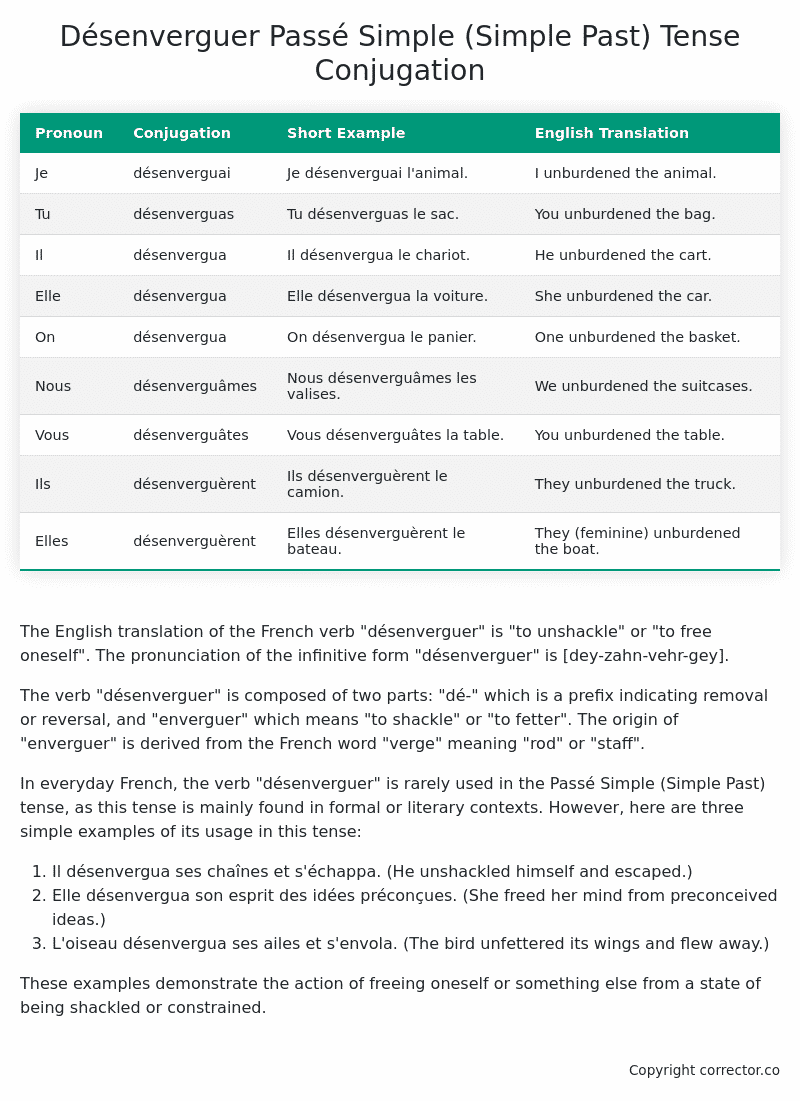Passé Simple (Simple Past) Tense Conjugation of the French Verb désenverguer
Introduction to the verb désenverguer
The English translation of the French verb “désenverguer” is “to unshackle” or “to free oneself”. The pronunciation of the infinitive form “désenverguer” is [dey-zahn-vehr-gey].
The verb “désenverguer” is composed of two parts: “dé-” which is a prefix indicating removal or reversal, and “enverguer” which means “to shackle” or “to fetter”. The origin of “enverguer” is derived from the French word “verge” meaning “rod” or “staff”.
In everyday French, the verb “désenverguer” is rarely used in the Passé Simple (Simple Past) tense, as this tense is mainly found in formal or literary contexts. However, here are three simple examples of its usage in this tense:
- Il désenvergua ses chaînes et s’échappa. (He unshackled himself and escaped.)
- Elle désenvergua son esprit des idées préconçues. (She freed her mind from preconceived ideas.)
- L’oiseau désenvergua ses ailes et s’envola. (The bird unfettered its wings and flew away.)
These examples demonstrate the action of freeing oneself or something else from a state of being shackled or constrained.
Table of the Passé Simple (Simple Past) Tense Conjugation of désenverguer
| Pronoun | Conjugation | Short Example | English Translation |
|---|---|---|---|
| Je | désenverguai | Je désenverguai l’animal. | I unburdened the animal. |
| Tu | désenverguas | Tu désenverguas le sac. | You unburdened the bag. |
| Il | désenvergua | Il désenvergua le chariot. | He unburdened the cart. |
| Elle | désenvergua | Elle désenvergua la voiture. | She unburdened the car. |
| On | désenvergua | On désenvergua le panier. | One unburdened the basket. |
| Nous | désenverguâmes | Nous désenverguâmes les valises. | We unburdened the suitcases. |
| Vous | désenverguâtes | Vous désenverguâtes la table. | You unburdened the table. |
| Ils | désenverguèrent | Ils désenverguèrent le camion. | They unburdened the truck. |
| Elles | désenverguèrent | Elles désenverguèrent le bateau. | They (feminine) unburdened the boat. |
Other Conjugations for Désenverguer.
Le Present (Present Tense) Conjugation of the French Verb désenverguer
Imparfait (Imperfect) Tense Conjugation of the French Verb désenverguer
Passé Simple (Simple Past) Tense Conjugation of the French Verb désenverguer (You’re reading it right now!)
Passé Composé (Present Perfect) Tense Conjugation of the French Verb désenverguer
Futur Simple (Simple Future) Tense Conjugation of the French Verb désenverguer
Futur Proche (Near Future) Tense Conjugation of the French Verb désenverguer
Plus-que-parfait (Pluperfect) Tense Conjugation of the French Verb désenverguer
Passé Antérieur (Past Anterior) Tense Conjugation of the French Verb désenverguer
Futur Antérieur (Future Anterior) Tense Conjugation of the French Verb désenverguer
Subjonctif Présent (Subjunctive Present) Tense Conjugation of the French Verb désenverguer
Subjonctif Passé (Subjunctive Past) Tense Conjugation of the French Verb désenverguer
Subjonctif Imparfait (Subjunctive Imperfect) Tense Conjugation of the French Verb désenverguer
Conditionnel Présent (Conditional Present) Tense Conjugation of the French Verb désenverguer
Conditionnel Passé (Conditional Past) Tense Conjugation of the French Verb désenverguer
Conditionnel Passé II (Conditional Past II) Tense Conjugation of the French Verb désenverguer
L’impératif Présent (Imperative Present) Tense Conjugation of the French Verb désenverguer
L’impératif Passé (Imperative Past) Tense Conjugation of the French Verb désenverguer
L’infinitif Présent (Infinitive Present) Tense Conjugation of the French Verb désenverguer
L’infinitif Passé (Infinitive Past) Tense Conjugation of the French Verb désenverguer
Le Participe Présent (Present Participle) Tense Conjugation of the French Verb désenverguer
Le Participe Passé (Past Participle) Tense Conjugation of the French Verb désenverguer
Struggling with French verbs or the language in general? Why not use our free French Grammar Checker – no registration required!
Get a FREE Download Study Sheet of this Conjugation 🔥
Simply right click the image below, click “save image” and get your free reference for the désenverguer Passé Simple tense conjugation!

Désenverguer – About the French Passé Simple (Simple Past) Tense
Formation
Usage
Narration
Historical Context
Interactions with other tenses
Passé Composé
Imparfait
Conditional and Subjunctive
Summary
I hope you enjoyed this article on the verb désenverguer. Still in a learning mood? Check out another TOTALLY random French verb conjugation!


